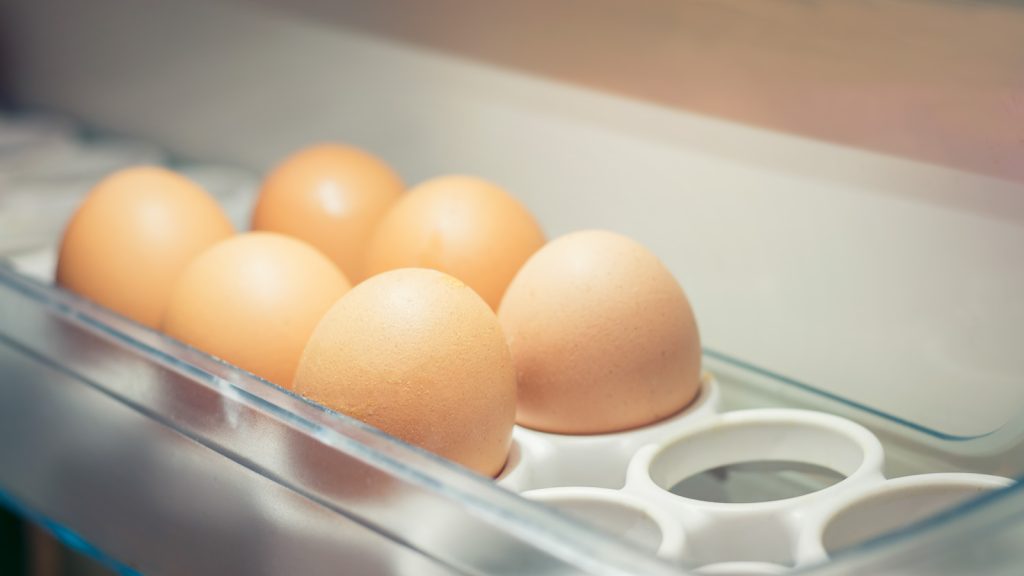Eggs are a versatile and healthy kitchen staple for most of us, but proper storage is needed to maintain their freshness and quality. Figuring out where to store eggs can be a common dilemma—whether it’s fridge, countertop, or even the freezer. In this guide, I’ll show you the pros and cons of each method and provide step-by-step procedures on how to store eggs to help you make the best choice for your specific needs.

This post may contain affiliate links. As an Amazon Associate, I earn from qualifying purchases. See my Affiliate Disclosure.
Storing Eggs in the Refrigerator
Refrigeration is the most common and widely recommended way to store eggs, as it helps prevent the growth of harmful bacteria and keeps them fresh for a longer time. Follow these steps for proper refrigeration:
Step 1: Original Carton
Keep eggs in their original carton, as it provides protection from odors and helps maintain a consistent temperature. The carton also has a date stamp, allowing you to track the freshness of the eggs.
Step 2: Refrigerator Zone
Place the egg carton in the main body of the refrigerator, not in the door. The door experiences temperature fluctuations due to frequent opening and closing, which can affect the eggs’ quality.
Step 3: Temperature Settings
Make sure that your refrigerator is set at or below 40°F (4°C). Eggs are sensitive to temperature changes, and refrigerating them at the right temperature is crucial for their safety and freshness.
Step 4: Egg Positioning
Store eggs with the pointed end down to help center the yolk and maintain overall egg quality. This position also minimizes the risk of bacteria entering the egg through the porous shell.
Storing Eggs on the Countertop
Contrary to popular belief, it is possible to keep store-bought eggs on the countertop under certain conditions. Backyard or farm eggs that haven’t been washed can and should be stored at room temperature. This method requires careful consideration of temperature and usage to ensure safety. Follow these steps for proper countertop storage:
Step 1: Source Quality Eggs
Purchase eggs from a reputable source, and make sure they are clean and free from cracks. Eggs with intact shells are less susceptible to contamination.
Step 2: Storage Temperature
Keep eggs at a consistent room temperature between 65°F to 70°F (18°C to 21°C). Avoid exposing them to direct sunlight or extreme temperature fluctuations.
Step 3: Limited Storage Duration
Store eggs on the countertop for no more than a week. The limited duration helps reduce the risk of bacterial growth and maintains egg quality.
Step 4: Regular Inspection
Inspect eggs regularly for any signs of spoilage, such as an off-putting odor or changes in appearance. If you notice any issues, throw out the eggs immediately.

Storing Eggs in the Freezer
If you happen to have too many eggs or wish to keep them fresh for a longer time, freezing is a practical choice. Here’s how to freeze eggs:
Step 1: Crack and Beat
Start by cracking the eggs into a bowl. Use a whisk or fork to beat them thoroughly. Be sure to incorporate both the egg whites and yolks to create a uniform mixture.
Step 2: Portioning
Pour the beaten eggs into an ice cube tray or a silicone mold. This allows you to portion the eggs conveniently, making it easier to use only what you need in future recipes.
Step 3: Freezing
Place the ice cube tray or silicone mold in the freezer. Once the eggs are frozen solid, transfer the individual portions into a freezer-safe bag. Label the bag with the date for reference.
Step 4: Thawing
When you’re ready to use the frozen eggs, transfer the desired number of cubes or portions to the refrigerator the night before to allow for slow, safe thawing.
Note: While freezing eggs is an excellent way to prevent waste, the texture may change slightly upon thawing. Therefore, it’s recommended for recipes where texture is less critical, such as baking or cooking.

Choosing the Right Storage Method
In the debate over how to store eggs, the best choice ultimately depends on your needs and preferences.
Refrigeration
Pros:
- Safety: Refrigeration inhibits bacterial growth, reducing the risk of contamination.
- Extended Shelf Life: Eggs stay fresh for a longer period when stored in the refrigerator.
- Versatility: Cold storage is suitable for a wide range of culinary applications.
Cons:
- Space Requirement: Refrigerator space may be limited, especially when dealing with large quantities.
- Texture Change: Extended refrigeration may slightly alter the texture of the eggs.
Countertop Storage
Pros:
- Better Taste: Some argue that eggs stored at room temperature may have a better taste in certain dishes.
- No Refrigerator Odors: Eggs won’t absorb odors from the refrigerator.
Cons:
- Safety Concerns: Rapid bacterial growth at room temperature poses a higher risk of contamination.
- Limited Shelf Life: Eggs must be used promptly to minimize safety risks.
- Controversial Practice: Countertop storage is not universally recommended due to safety concerns.
Freezing
Pros:
- Extended Preservation: Freezing significantly prolongs the shelf life of eggs.
- Convenient Portions: Pre-cracked and frozen eggs in ice cube trays offer convenient portions.
- Versatility: Frozen eggs can be used in various recipes.
Cons:
- Texture Alteration: Thawed eggs may have a different consistency compared to fresh ones.
- Space Requirement: Requires freezer space for storage.
- Separation Required: Yolks and whites often need to be separated before freezing.
Refrigeration is the safest and most widely recommended method, offering a balance between food safety and preservation. Freezing eggs is a practical solution for extending their shelf life, especially when you have an abundance. Countertop storage is controversial and requires careful consideration of safety measures.
Wrapping Up
When deciding how to store eggs, consider factors such as your cooking habits, the quantity of eggs you have, and the shelf life you need. If you frequently use eggs and go through them quickly, refrigeration is a reliable option. For those looking to preserve eggs for a more extended period, freezing can be a game-changer. However, countertop storage should be approached with caution to ensure the safety of the eggs.
Ultimately, whether you choose the freezer, fridge, or countertop, it’s crucial to understand the impact of each storage method to preserve egg quality and guarantee the safety of your culinary delights.


